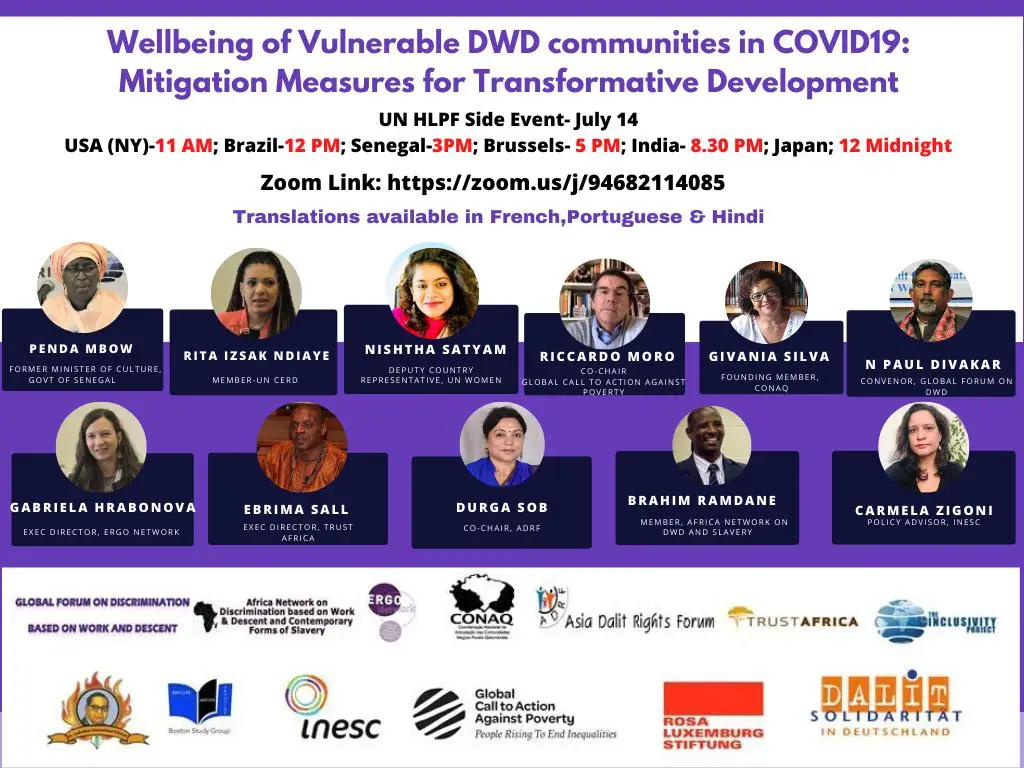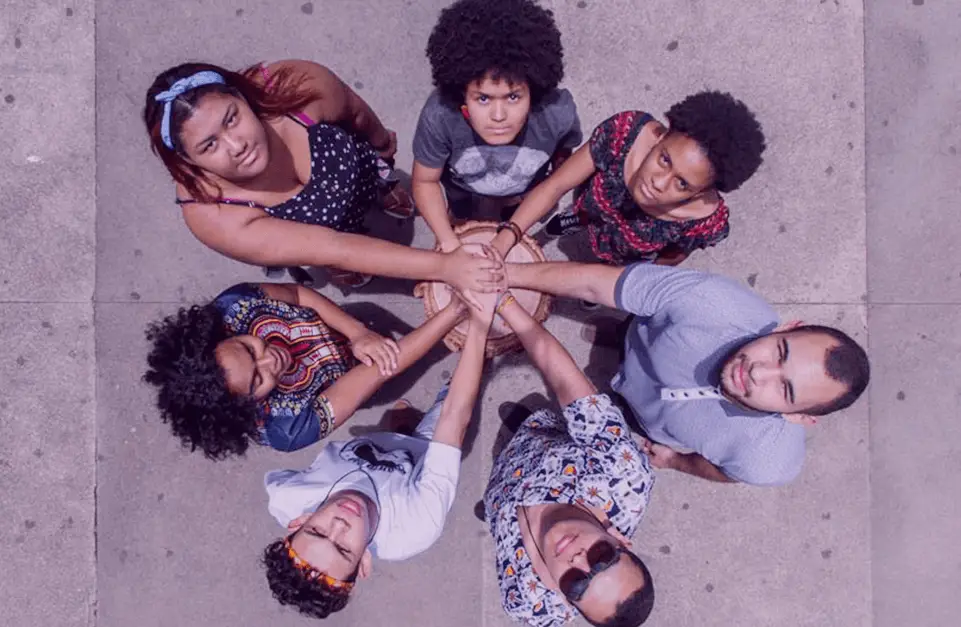On the last July 14, Inesc participated in the side event promoted by the Global Forum against Discrimination (GfoD), held within the scope of the United Nations High Level Political Forum (HLPF 2020), where it denounced the impacts of Covid-19 in the most discriminated populations.
The organizations that make up the Forum also presented the situations of their respective countries, such as the Haratines in Mauritania, the Forgerons in West Africa, the Bantu in Sudan, the Roma community in Europe, the Burakumin in Japan and the Dalits in South Asia . The meeting also had the participation of Givania Silva, Coordinator of the National Coordination of Black Rural Quilombola Communities (CONAQ), who presented the situation of quilombola communities in Brazil.
The Global Forum against Discrimination was created in September 2019, during the activities of HLPF 2019, and was articulated by the NGO National Campaign on Dalits Human Rights (NCDHR), from India. The term DWD – Discrimination based on work and descent, is used to define the type of discrimination suffered by Dalits. However, the Global Forum against Discrimination welcomes other discriminated social groups, such as the Roma, from Europe and the Quilombolas, from Brazil, because they understand that in general the human rights violations they suffer have some similarities, related to historical structures of domination, and that together they can influence to change this situation.
The speech by Inesc’s Political Advisor, Carmela Zigoni, follows below.
Brazil reaches today with the mark of 1 million and 8 hundred and 85 thousand confirmed cases of corona virus and more than 72 thousand deaths. Looking back, the month of March ended with 6 thousand cases and 500 deaths. At that time, the president Jair Bolsonaro publicly stated that Covid-19 was just a “mild cold”.
In these four months, the country has lived with a chaotic management of crisis, where two health ministers resigned their positions for not agreeing with the guidelines imposed by the president, who acted from the beginning against social isolation.
The Covid-19 pandemic made economic and social inequalities in Brazil more evident. The most vulnerable groups in society are also the most affected by the Corona virus: indigenous people, quilombolas, the black population living in slums, homeless, waste pickers, women and the LGBT population.
Brazilian inequality has similarities with other places in the world, as it has its origins in the colonization process, where racial and gender markers were strategic for the policies of control and domination of indigenous and Afro-descendant groups. Brazil was the last country in the West to abolish slavery, in 1888. In other words, since the occupation of this territory by Europeans, we lived 3 hundred 88 years with slavery and only 132 years with freedom.
The legacy of this process is structural racism, materialized by institutional and personal racism. An example of how this happens in practice is the naturalization of the place of black women in carrying out domestic work in white families’ homes: the domestic workers were the last to achieve equal labor rights, in 2017. Or in political representation, where although blacks represent half of the population, in the Parliament they are less than 25%, and currently we have only one indigenous representative. The same Parliament has only 15% women. And so it is in all public and private institutions in Brazil. Another example is the criminalization of poverty that generated a true genocide of black youth: about 20,000 thousand young blacks killed a year in the name of the war on drug trafficking.
Now, with the pandemic, although the contamination rate between whites and blacks is similar, blacks die more: the lethality rate among whites is 38% and among blacks 55%. In favelas, where it is more difficult to comply with hygiene and social distance recommendations, due to poor basic sanitation and housing conditions, black poor people have three problems: the virus, the hunger and the presence of the police forces. And are the blacks, especially black women, that are in the front line of the Covid-19 in the caring services and what it is called essential activities: as cleaning, food delivery, etc.Brazil reached 2020 without conditions to face the health crisis, as pointed out by the Inesc report – Brazil with low immunity, published in April this year. The social cuts initiated in 2015 with fiscal austerity led to the under-funded of the Public Health System by approximately $ 3.7 billion in 5 years, at the same time that the population grew. Education and environment policies are also underfunded, I believe that everyone should remember what happened to the Amazon last year. And the fiscal injustice is historical in the country.
Parliament approved in April the amount of $60 billion in budget to tackle the pandemic, but only 40% of the proceeds have been spent so far. The great victory of civil society was the emergency basic income, approved by Parliament against the will of the president. This resource aims to serve more than 50 million Brazilians in extreme poverty, in the form of a monthly payment of $ 100 for workers who have earned less than $ 5,000 in 1 year, but the digital exclusion and civil documentation has hampered access for women. people who need it most.
In relation to quilombolas, their identity and their rights were recognized in the 1988 Constitution. Quilombolas are the descendants of enslaved Africans who resisted established power and founded sustainable communities far from the colonial order. They currently suffer from the pressures of mining and agribusiness ventures, and a series of human rights violations.Today, Brazil has more than 2,000 thousand quilombola communities, but less than 7% of its lands have been officially recognized. The entire budget for quilombola communities has been cut since 2016.
Now, in the pandemic, they are carrying out autonomous monitoring of cases and deaths, since the health system ignores them completely. Last week, the president vetoed 16 points of the emergency bill for indigenous and quilombola peoples (pl1142/2020), including guaranteeing access to drinkable water, testing for Covid-19 and the distribution of masks.
We know that race is a social construction of colonialism, a mechanism used to subdue certain peoples in relation to others. We thought that the world, after the United Nations Declaration, would be moving to overcome this sad page of history, but what we see today in several countries is the deepening of unequal relations based on racism. In Europe, the resurgence of neo-Nazi groups; in the United States, armed white supremacists on the streets, authorized by the president’s speeches. In Brazil, Pandemic reveals to the world the structural racism of our society. The whole world is saying that Black lives matter. In Brazil we are saying: As long as there is racism there will be no democracy. The Global Forum against Discrimination, becomes even more relevant in this scenario.


